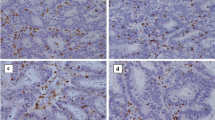Abstract
Background
Tumor-infiltrating T lymphocytes (TIL) play an important role in primary colorectal cancer, but their activity in liver metastases has not yet been investigated. The aim of this study was to examine whether tumor-selective infiltration, activation, and cytotoxic activity of TIL can be demonstrated in situ in colorectal liver metastases.
Methods
TIL were obtained from liver metastases and corresponding normal liver tissue of 16 patients with colorectal liver metastases. Characterization of TIL in situ was performed by multicolor flowcytometric analysis. Presence of tumor antigen-reactive T cells was evaluated by interferon gamma Elispot analysis.
Results
TIL in colorectal liver metastases responding against tumor antigens were present in most patients. Although the proportions of CD3+ T cells were comparable in liver metastasis and normal liver tissue, metastases contained significantly enhanced proportions of CD4+ cells (49% vs. 22%, P < .001). Among all CD4+ T helper cells, the proportion of activated (CD4+CD25+) effector cells was significantly increased in liver metastases (15.0% vs. 7.8%, P = .003). Metastases showed significantly higher proportions of activated (CD69+ [70.1% vs. 49.8%, P = .02] and CD25+ [4.1% vs. .6%, P = .06]) and cytotoxically active (CD107a+) CD8+ TIL (3.2% vs. 1.3%, P = .03). Importantly, the presence of activated T helper cells correlated with the frequencies of cytotoxic T lymphocytes that exerted cytotoxic activity in situ (P = .02).
Conclusion
CD4+ and CD8+ TIL are selectively activated in liver metastases, and cytotoxic T lymphocytes exert tumor-selective cytotoxic activity in situ in the presence of activated T helper cells, suggesting the requirement of in-situ-activated T helper cells for efficient cytotoxic T lymphocytes effector function.




Similar content being viewed by others
References
Weitz J, Koch M, Debus J, et al. Seminar: colorectal cancer. Lancet 2005;365:153–65
Mocellin S, Mandruzzato S, Bronte V, et al. Vaccines for solid tumours. Lancet Oncol 2004;5:681–9
Yang L, Carbone DP. Tumor-host immune interactions and dendritic cell dysfunction. Adv Cancer Res 2004;92:13–27
Parmiani G. Tumor-infiltrating T cells—friend or foe of neoplastic cells? N Engl J Med 2005;353:2640–1
Chiba T, Ohtani H, Mizoi T, et al. Intraepithelial CD8+ T-cell count becomes a prognostic factor after a longer follow-up period in human colorectal carcinoma: possible association with suppression of micrometastasis. Br J Cancer 2004;91:1711–7
Naito Y, Saito K, Shiiba K, et al. CD8+ T cells infiltrated within cancer cell nests as a prognostic factor in human colorectal cancer. Cancer Res 1998;61:3491–4
Menon AG, Janssen-van Rhijn CM, Morreau H, et al. Immune system and prognosis in colorectal cancer: a detailed immunohistochemical analysis. Lab Invest 2004;84:493–501
Galon J, Costes A, Sanchez-Cabo F, et al. Type, density, and location of immune cells within human colorectal tumors predict clinical outcome. Science 2006;313:1960–4
Phillips SM, Banerjea A, Feakins R, et al. Tumour-infiltrating lymphocytes in colorectal cancer with microsatellite instability are activated and cytotoxic. Br J Surg 2004;91:469–75
Pagès F, Berger A, Camus M, et al. Effector memory T cells, early metastasis, and survival in colorectal cancer. N Engl J Med 2005;353:2654–66
Koch M, Beckhove P, Op dW, et al. Tumor infiltrating T lymphocytes in colorectal cancer: tumor-selective activation and cytotoxic activity in situ. Ann Surg 2006;244:986–92
Ziegler SF, Ramsdell F, Alderson MR. The activation antigen CD69. Stem Cells 1994;12:456–65
Rubio V, Stuge TB, Singh N, et al. Ex vivo identification, isolation and analysis of tumor-cytolytic T-cells. Nat Med 2003;9:1377–82
Bai L, Beckhove P, Feuerer M, et al. Cognate interactions between memory T cells and tumor antigen-presenting dendritic cells from bone marrow of breast cancer patients: bidirectional cell stimulation, survival and antitumor activity in vivo. Int J Cancer 2003;103:73–83
Solomayer EF, Feuerer M, Bai L, et al. Influence of adjuvant hormone therapy and chemotherapy on the immune system analysed in the bone marrow of patients with breast cancer. Clin Cancer Res 2003;9:174–80
Feuerer M, Beckhove P, Bai L, et al. Therapy of human tumors in NOD/SCID mice with patient-derived reactivated memory T cells from bone marrow. Nat Med 2001;7:452–8
Schmitz-Winnenthal FHVC, Zgraggen K, Galindo L, et al. High frequencies of functional tumor-reactive T cells in bone marrow and blood of pancreatic cancer patients. Cancer Res 2005;65:10079–87
Jarnicki AG, Lysaght J, Todryk S, et al. Suppression of antitumor immunity by IL-10 and TGF-beta-producing T cells infiltrating the growing tumor: influence of tumor environment on the induction of CD4+ and CD8+ regulatory T cells. J Immunol 2006;177:896–904
Diederichsen ACP, Hjelmborg JvB, Christensen PB, et al. Prognostic value of the CD4+/CD8* ratio of tumour infiltrating lymphocytes in colorectal cancer and HLA-DR expression on tumour cells. Cancer Immunol Immun 2003;52:423–8
Nummer D, Suri-Payer E, Schmitz-Winnenthal H, et al. Role of tumor endothelium in CD4+ CD25+ regulatory T cell infiltration of human pancreatic carcinoma. J Natl Cancer Inst 2007;99:1188–99
Wang RF. Immune suppression by tumor-specific CD4+ regulatory T-cells in cancer. Semin Cancer Biol 2006;16:73–9
Koizumi K, Hojo S, Akashi T, et al. Chemokine receptors in cancer metastasis and cancer cell–derived chemokines in host immune response. Cancer Sci 2007;98:1652–8
Hojo S, Koizumi K, Tsuneyama K, et al. High-level expression of chemokine CXCL16 by tumor cells correlates with a good prognosis and increased tumor-infiltrating lymphocytes in colorectal cancer. Cancer Res 2007;67:4725–31
Author information
Authors and Affiliations
Corresponding author
Additional information
P. Wagner and M. Koch contributed equally to this study.
An erratum to this article can be found at http://dx.doi.org/10.1245/s10434-008-0119-4
Rights and permissions
About this article
Cite this article
Wagner, P., Koch, M., Nummer, D. et al. Detection and Functional Analysis of Tumor Infiltrating T-Lymphocytes (TIL) in Liver Metastases from Colorectal Cancer. Ann Surg Oncol 15, 2310–2317 (2008). https://doi.org/10.1245/s10434-008-9971-5
Received:
Revised:
Accepted:
Published:
Issue Date:
DOI: https://doi.org/10.1245/s10434-008-9971-5




